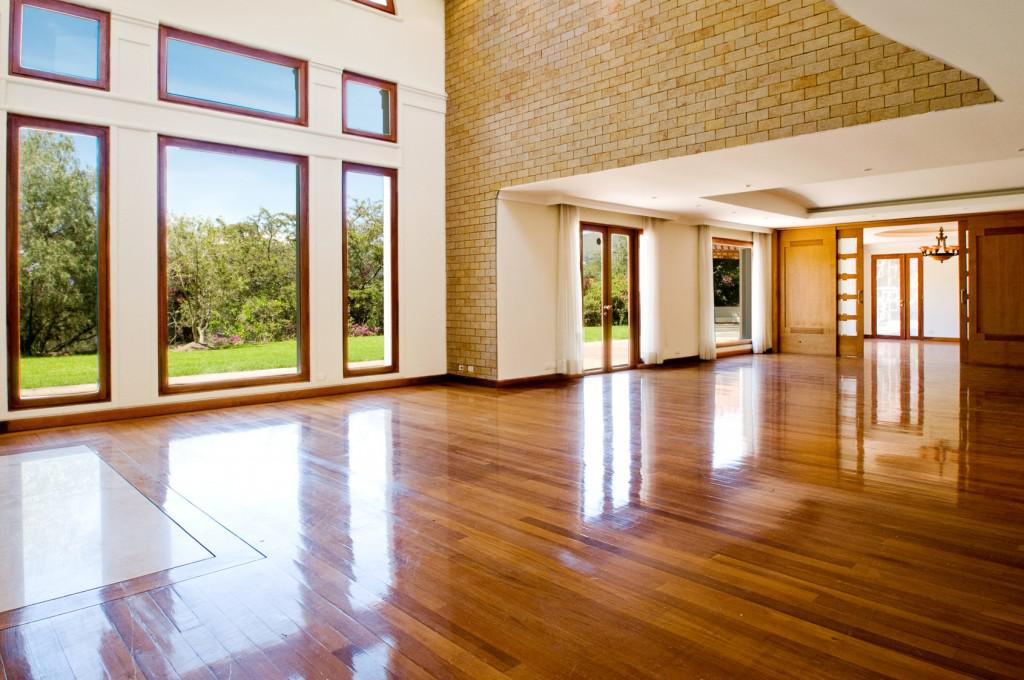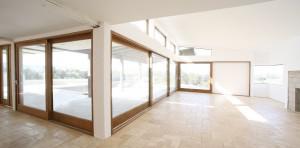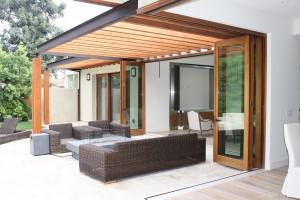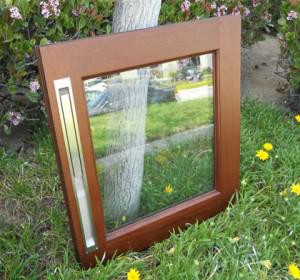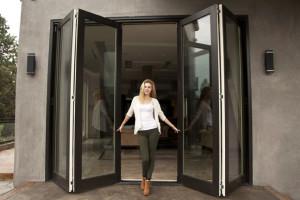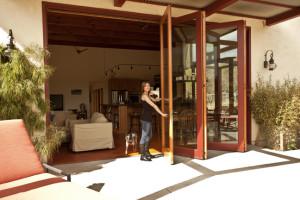|
AG MILLWORKS BLOG Looking for project inspiration, before and afters, FAQs, and expert advice? You've come to the right place! Explore the blog to learn more about our folding, sliding, and swing door systems. |
|
Monday, August 11 2014
While most of your home’s design is intended for functional purposes, doors and windows have the power to not only light up a room, but change your mood, your health, and the comfort of your home. While you may think your attention is better focused on interior design and following the latest trend, the doors windows of your home (also known as fenestration) are the most important aspect. Natural light can make the difference between an ordinary house and a luxurious, spacious home. Here is a list of reasons why you should invest in beautiful large doors windows:
§ The biggest advantage is the mood changing benefits that come from natural light. Just as relaxing in the sun provides you with enjoyable feelings and sensations, natural light from large windows will give you the same positive emotions. Light from an artificial source simply does not make us feel the same happy thoughts. § Rooms that are illuminated and well-lit give off a spacious feel. § When we are stuck in the office all day, we forget how amazing the sunlight feels. Our bodies receive both therapeutic and mental health benefits from the natural light that comes through large windows.
At AG Millworks, we understand the importance of having a natural light source in our homes. That is why we handcraft the most strikingly beautiful patio doors and windows so you can reap benefits the benefits of natural light. Choose from Bi-Folds, lift and slides, multi-slides, standard sliders, and almost any window imaginable. Whatever your door and window goals are, we promise to exceed your expectations so you can transform your house into a beautiful masterpiece you will feel lucky to wake up in every day.
Click on the Match Me with a Dealer button and we’ll get started building your dream doors and windows. We can help you transform your home and exceed your expectations with our highly innovative designs.
Monday, August 04 2014
Your patio door is the opening to a relaxing space that is all your own where you can settle down after a long day at work. There is nothing more beautiful than being welcomed home by your entire backyard and view without even having to open a door. The expansive glass patio door is one of the most aesthetically pleasing features of a home. It creates an inviting atmosphere with a breathtaking view. If you are looking to add a large glass patio door to your life, there are a variety of options to consider. Here are a few helpful tips:
§ Sliding Doors offer the most universal benefits and pair perfectly with any home design theme. Whether you are looking for a contemporary look or want to stick to traditional design, a sliding glass door will give a spacious, aesthetically pleasing feel. AG Millworks offers beautiful choices in the “Lift and Slide Patio Doors Without Pocket” category. Our “Pocketing Life and Slide Patio Doors” allow you to conceal your door completely when open. Since your door will be completely concealed in the wall, you will be able to blend the indoor and outdoor atmosphere seamlessly. With either option, you have the freedom to choose from an array of natural interior wood surfaces while eliminating the need to step over a sill. § Bi-Fold Doors differ from sliding glass doors in that they fold, accordion-style against one side of the opening. If you do not have the wall space for in-wall pockets, this is the best alternative and it will offer just as beautiful a view as a sliding glass door with pockets. AG Millworks offers both all wood and aluminum clad/wood Bi-Fold doors. If you choose an odd number of door panels such as 3, 5 or 7 for your Bi-Fold door, you’ll have a standard daily door for quick in and out trips to the patio, which is super convenient. We can offer you the smoothest transition from inside to outside with our innovative designs. You are welcome to choose from an array of wood species, and we’ll even apply a different wood species on the outside and inside surfaces of almost any door or window we make.
Click on the Match Me with a Dealer button. We’ll guide you through the process of choosing the perfect glass patio door for your indoor/outdoor living space.
Thursday, July 24 2014
Have you been considering building your dream home or renovating your existing home but constantly put it off because you aren’t sure your dream is an attainable one? At AG Millworks, we strive to make your greatest dreams come true when it comes to your door and window needs. In all of our work, we start with honesty and integrity, and then focus on beauty. We take pride in the beautiful craftsmanship we offer many homeowners and work with you to satisfy your needs.
Since 1986, we have brought to reality the homeowner’s dream of top quality American-crafted fenestration products for their homes. We exclusively customize each patio door, entry door and window for our customer’s specific desires, insuring that their unique design needs are met. Our top quality craftsmanship reflects our business philosophy.
All of our doors and windows are handcrafted with a timber core for better insulation than hollow aluminum products. Our wood species also provide the most aesthetically pleasing results. You can choose from Cherry, Sipo Mahogany, African Mahogany, North American White Oak, Rift Sawn White Oak, Knotty Alder, Knotty Cedar, Douglas Fir, Teak, Walnut, Genuine Mahogany, North American Red Oak, Quarter Sawn White Oak, Clear Alder, Clear Cedar, Poplar, and Pine. The stains and topcoats we use in our factory pre-finish booth are super low V.O.C and water based, so you will not have to worry about your family breathing unhealthy fumes.
Click on the Match Me with a Dealer button and we’ll get started building your dream doors and windows.
Thursday, June 12 2014
When the weather is gorgeous and you’re having a party that stretches from the great room to the patio to the pool, you want your patio doors to…..well—disappear!
AG Millworks Pocketing Lift and Slide Patio Doors will literally disappear into a pocket in the wall, with the help of the new Foldaway Lift and Slide Handle. Featuring sleek, contemporary design in multiple finishes coupled with durable dependability, this innovative handle folds into itself and before you can say Abracadabra, your patio doors are out of sight.
Our expert dealers will help you choose the AG Millworks door that is ideal for you and your home. You dream it, we’ll create it!
Click on Match Me with a Dealer or call us at 1-800-559-9995 for a quick dealer referral now!
Monday, May 12 2014
Whether you are commissioning plans to build your dream home from the dirt up, or contemplating a remodel of the home you already have, there are bound to be a lot of professionals and tradespeople involved in the process, and it is easy to lose your voice in the crowd when trying to communicate and get what you want. At a minimum, the players in your soon-to-be-real-life-drama will include architect, builder, interior designer, sash and door dealer, cabinet supplier, plumbing and fixture supplier, flooring supplier, subcontractors….okay–you get the idea. Don’t get me wrong, these people are critical to the success of your project. But the key phrase here is that this is your project. Get what you want. Or at least get as close as you can.
Keep in mind that building a house or even remodeling one is often cited as the most stressful time in a couple’s life—right up there with becoming new parents!
In my 27 years in the custom millwork business, I have often heard people say “What I really wanted was this, but my [insert any player from the list above] said I couldn’t have it.” This cringe-worthy statement is exactly what I’m talking about. Yes, building codes and ordinances do govern– and in some cases dictate or limit– what materials (glass type, fire-proof tiles instead of a wood shake roof, etc.) can be used in certain geographic locations—for example building in a fire zone in California requires that glazing in all doors and windows have two panes and that one of the panes be tempered.
To illustrate the point, a customer of one of our dealers came to the factory about a year ago to look at our retractable accordion screen systems for the estate they were building in a fire zone. As she ran her hands reverently over the beautiful wood interiors of the doors in our showroom, I asked her why she was only considering our screen system and why she was buying aluminum doors with no wood interiors when her house was Spanish style. You guessed it. She said, “Wood is what I really wanted, but my architect said I couldn’t have it because we’re in a fire zone.” If she’d done a little homework, she would have known that her architect was incorrect; she could have had almost exactly what she wanted: aluminum-clad exteriors in any imaginable color, and any wood species she wanted on the interiors–and would have exceeded the CBC requirement for doors and windows in a fire zone. But the aluminum doors and windows were already on order and paid for, and it would have been downright cruel to say anything to her at that point.
So doesn’t it makes sense to arm yourself with basic knowledge of the restrictions, allowances and requirements that will affect your project before your architect invests a great deal of your money designing in one direction when you may want to go in a completely different direction? This is especially true if you are working with an architect who practices mostly in another region—maybe she designed your ski chalet in Tahoe and you want her to design your new house in Santa Barbara where local design and building requirements may be completely different. You might be thinking, “My [insert any player from the list above] is supposed to be the expert– that why I’m paying them the big bucks!”
Well that, my friend is a good way to get what you don’t want. You need to know a little bit about the requirements for your area so you can be sure you are getting the correct information from your experts.
Before you start pushing dirt around…. and before you start to write checks, it is important to sit down with your family and brainstorm for a bit on how you live in your current home and what changes would enhance your life in your new home—do you wish you had an outdoor eating area or outdoor fireplace? Does your family spend most of its together time in the kitchen? Is your home or future home in an area where screens are a must for bug-free living (horse country)? Do you pine for the warmth of real wood on the interior side of your doors and windows? Visualize the placement of your various patio doors– will it be all about admiring an ocean or mountain view, or does the door look out onto a fence or garden wall? If the doors open out to a narrow balcony or side yard, sliding doors will take up less outdoor living space than Bi-Fold patio doors or swinging French doors. There are more styles of patio doors and entry doors to choose from than ever before, and there is a lot to consider.
So be clear and firm about what you want, be realistic and flexible about what is possible, and make sure that your voice is heard in the crowd. This is your project. Oh, and by the way, you might want to keep a marriage counselor on speed dial.
This opinion piece was written by Maria Schell Burden, and does not necessarily reflect the views of AG Millworks. A special thanks to Rich Mathieu of Associated Building Supply for fact-checking on building codes.
Saturday, April 12 2014
A sill is that thing you step over (sometimes referred to as a threshold) when you pass through a door opening. You may never notice it, but the sill plays an important role in weatherproofing any doorway that leads into your home. Almost every swinging door has a sill of some sort, with good reason. In order for a door to swing or slide freely, there must be a certain amount of airspace around the perimeter, and therefore, a gap where air and water could conceivably penetrate and enter the interior spaces of your home, especially at the base of the door. A raised sill creates a barrier to keep any water that may collect around the base of the door from entering your home during a driving rain storm. Important, right?
Well now consider your patio door sill. Patio door openings can range from 5 feet to up to 50 feet or more in width and up to 12-feet in height. That’s a lot of wide open space; and patio doors are often positioned on the most exposed elevation of your house. It is important to consider whether you need a raised sill as a water barrier, or if the opening has enough protection to consider a sleek, recessed track system or recessed channel system for your masterpiece of indoor/outdoor living.
For a Bi-Folding patio door you have three sill/no sill options.
1. A Raised Sill made from aluminum or wood with a built-in weep system to collect water and divert it to the exterior through the front of the sill. A raised sill offers the very best protection from water penetration, but with a 2” tall dam on the interior face of the sill, this thing is hard to miss, and you and your guests have to step over it when passing through the doorway. 2. A Raised ADA Sill in aluminum with no weep system, which requires a 1″ wide x ½” deep channel be cut into the concrete to install it. Although this option is required in commercial applications and is needed in a home where a wheelchair is part of daily life, this sill has no dam to stop water and no weep system, so is not appropriate where weather exposure is a problem. 3. A Recessed Channel—this option requires that a 1” wide x ¾” deep channel be cut into the concrete. An aluminum “u” channel is fixed into the cutout and the top of it sits perfectly flush with the finished floor. This gives you the most unobstructed indoor/outdoor appearance and nothing to step over or trip over. A recessed channel has no weep system and offers absolutely no protection against water entering the house, since there is no dam to keep water out and is really only appropriate where rain and garden hoses can never hit this door. Only stone, tile, or other water- resistant flooring material should be used to the inside of any door that does not have a raised sill—never wood, which would be damaged by any water that might find its way into the house.
For a Lift and Slide Patio Door or Multi-Slide Patio Door, you have two options, one with a sill, and one with tracks only.
1. A Raised Sill made from aluminum or wood with a raised track set into it for each sliding door panel. The raised sill has a 2” dam on the interior so it provides superior protection against water penetration. 2. A Stainless Steel Recessed Track System that is concealed beneath the finished floor, so the only thing visible after flooring is installed is a ¼” x 1/8” strip of stainless steel for each active door panel. A stainless steel recessed track system is great for openings with no weather exposure, and gives you an almost completely unobstructed floor with no sill to step over, but offers absolutely no protection against water penetration.
Before you purchase your AG Millworks patio doors, your sash and door supplier and builder will help you choose the right sill option for your patio doors and AG Millworks will build your patio doors exactly as you specify them. So what are you waiting for? Let’s get your patio door into production! Just click here: Match me with a Dealer
Friday, April 12 2013
This 5-Door Bi-Fold is 15 feet wide and 10 feet tall and all doors fold to the right with a daily door. Large-scale patio doors that open up entire walls are becoming more popular than ever. And it’s easy to see why people are planning them into their new custom homes. If panoramic views and indoor/outdoor living appeal to you, then read on to learn which type of patio door is best for your home, your lifestyle, and how you might use the door in your everyday life.
Bi-Folds are a series of patio door panels hung from the head jamb and hinged together to slide accordion-style and stack against one edge of the opening or the other (see above). The benefit of a Bi-Fold door is that when the doors are all open stacked to the side, you have only a small part of the opening used because the door faces are stacked against each other. You need a strong header in the opening to install the Bi-Folding door system to, or the doors will not fold smoothly.
If there is a downside to a Bi-Fold door system, it is that the doors fold to the exterior, so the bundle of folded doors will stick outward onto the patio as much as 36.” Bi-Fold door panels can’t be too wide because they hang from the head jamb, so they require a larger number of doors to bridge an opening, and when closed, the door panels sit side by side (edge to edge), which makes for less daylight than in a sliding door system.
Bi-Fold Design Tip: When planning your Bi-Fold door system, be ODD! That’s right, an odd number of doors folding in one direction gives you a Daily Door on one side. Just heading out to the barbecue? The daily door can fold with the rest of the doors, and also serves as a single swinging french door when you don’t want to fold open the entire unit. So think 3,5 or 7 doors for the most user-friendly door system.
Lift and Slide Patio Doors Lift and slide patio doors are a more massive version of the typical sliding patio door system you may be familiar with. European hardware makes it easy to smoothly slide doors that are extremely wide and thick so you can open up entire walls with the turn of a handle. The doors slide on a staggered track system and “telescope” (pull the door behind it along as When fully open, lift and slide doors stack directly behind one behind the other, and when closed their stiles (vertical members of the door that block the view) overlap so you have more daylight per door than with a Bi-Folding system.
The downside to sliding patio door systems is that there is always a door or doors covering up part of the opening, even when all the doors are in the fully open position. Another consideration is that each lift and slide door is 2-1/4″ thick, so in order to slide more than a few doors in any direction, you will need a fairly thick wall to accept the sliding door jamb. This wide wall can be easily planned into a new home, but if you are remodeling your existing home, you might have to do some reframing of the wall where the lift and slide is going to go.
Pocketing Lift and Slide Patio Doors The best possible way to live the indoor/outdoor lifestyle is to have your builder construct a “pocket” in the wall that all of the doors can slide into and hide whenever you want the wall open. Pocketing sliding doors can be ordered with either removable handles or folding handles, so the doors can slide all the way into the pocket and disappear. When you want to close off the opening again, a retractable pull in the leading edge of the first door can be popped out and used to begin sliding the doors out of the pocket.
So, Bi-Fold or Lift and Slide? We’d like to hear how you will expand your world view!
Friday, April 12 2013
This 5-Door Bifold is 15 feet wide and 10 feet tall and all doors fold to the right with a daily door. Large-scale patio doors that open up entire walls are becoming more popular than ever. And it’s easy to see why people are planning them into their new custom homes. If panoramic views and indoor/outdoor living appeal to you, then read on to learn which type of patio door is best for your home, your lifestyle, and how you might use the door in your every day life.
Bifolds are a series of patio door panels hung from the head jamb and hinged together to slide accordion-style and stack against one edge of the opening or the other (see above). The benefit of a bifold door is that when the doors are all open stacked to the side, you have only a small part of the opening used because the door faces are stacked against each other. You need a strong header in the opening to install the bifolding door system to, or the doors will not fold smoothly. If there is a downside to a bifold door system, it is that the doors fold to the exterior, so the bundle of folded doors will stick outward onto the patio as much as 36.” Bifold door panels can’t be too wide because they hang from the head jamb, so they require a larger number of doors to bridge an opening, and when closed, the door panels sit side by side (edge to edge), which makes for less daylight than in a sliding door system. Bifold Design Tip: When planning your bifold door system, be ODD! That’s right, an odd number of doors folding in one direction gives you a Daily Door on one side. Just heading out to the barbecue? The daily door can fold with the rest of the doors, and also serves as a single swinging french door when you don’t want to fold open the entire unit. So think 3,5 or 7 doors for the most user-friendly door system. Lift and Slide Patio Doors Lift and slide patio doors are a more massive version of the typical sliding patio door system you may be familiar with. European hardware makes it easy to smoothly slide doors that are extremely wide and thick so you can open up entire walls with the turn of a handle. The doors slide on a staggered track system and “telescope” (pull the door behind it along as When fully open, lift and slide doors stack directly behind one behind the other, and when closed their stiles (vertical members of the door that block the view) overlap so you have more daylight per door than with a Bi-Folding system. The downside to sliding patio door systems is that there is always a door or doors covering up part of the opening, even when all the doors are in the fully open position. Another consideration is that each lift and slide door is 2-1/4″ thick, so in order to slide more than a few doors in any direction, you will need a fairly thick wall to accept the sliding door jamb. This wide wall can be easily planned into a new home, but if you are remodeling your existing home, you might have to do some reframing of the wall where the lift and slide is going to go. Pocketing Lift and Slide Patio Doors The best possible way to live the indoor/outdoor lifestyle is to have your builder construct a “pocket” in the wall that all of the doors can slide into and hide whenever you want the wall open. Pocketing sliding doors can be ordered with either removable handles or folding handles, so the doors can slide all the way into the pocket and disappear. When you want to close off the opening again, a retractable pull in the leading edge of the first door can be popped out and used to begin sliding the doors out of the pocket. So, bifold or lift and slide? We’d like to hear how you will expand your world view! |
Latest Posts
Archive Categories
|
|



